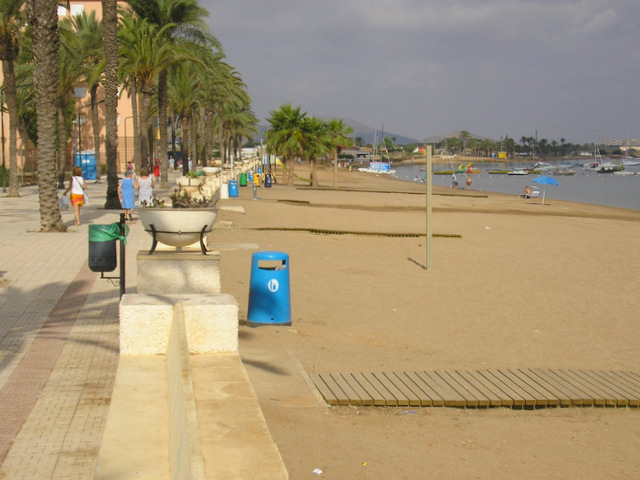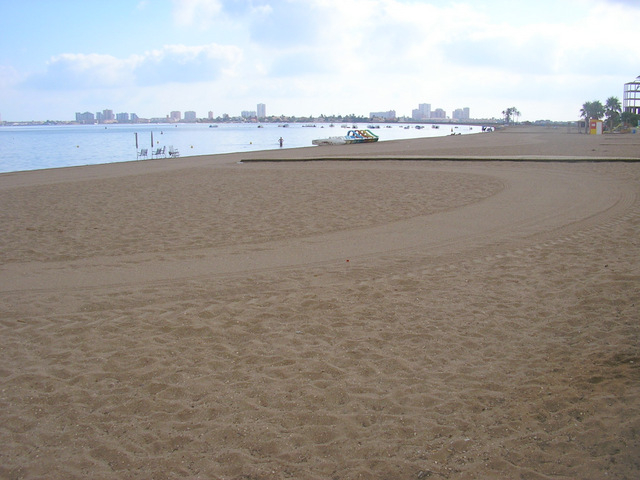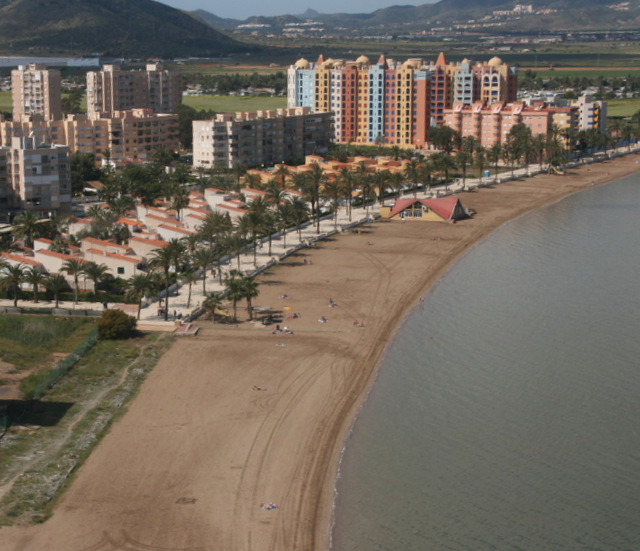- Region
- Vega baja
- Marina Alta
- Marina Baixa
- Alicante
- Baix Vinalopo
- Alto & Mitja Vinalopo
-
ALL TOWNS
- ALICANTE TOWNS
- Albatera
- Alfaz Del Pi
- Alicante City
- Alcoy
- Almoradi
- Benitatxell
- Bigastro
- Benferri
- Benidorm
- Calosa de Segura
- Calpe
- Catral
- Costa Blanca
- Cox
- Daya Vieja
- Denia
- Elche
- Elda
- Granja de Rocamora
- Guardamar del Segura
- Jacarilla
- Los Montesinos
- Orihuela
- Pedreguer
- Pilar de Horadada
- Playa Flamenca
- Quesada
- Rafal
- Redovan
- Rojales
- San Isidro
- Torrevieja
- Comunidad Valenciana
Cartagena beaches: Playa Honda
The Q for Quality flag flies at this kilometre-long Mar Menor beach
The beach at Playa Honda is a wide north-facing expanse of fine sand at the southern end of the Mar Menor which is popular with bathers all year round due to the warm temperatures and calm conditions of the sea in the saltwater lagoon.
The beach is over a kilometre in length, and 20 metres wide, and has been awarded a Q for Quality flag in recognition of the quality of its services.
All of the beaches listed as Mar Menor beaches are inside the circle of the Mar Menor, which covers a surface area of nearly 170 square kilometres, with 70 kilometres of internal coastline, separated from the Mediterranean by a 22km long strip of land, La Manga del Mar Menor, which is connected to the Mediterranean via a canal channel, feeding the Mar Menor with natural saltwater.
It has shallow fringes, which slope gently, and is only 7 metres deep in the centre, so the water temperature is warmer than that of the Mediterranean, particularly around the edges where it is possible to wade out 50 metres from the shore and still only be waist deep.
Murcia is the warmest mainland region in Spain, and has an average temperature of 18 degrees, which makes it perfect for year-round watersports activity and bathers can enjoy the waters of the Mar Menor for most of the year. The water in the Mar Menor is not tidal and has no currents or waves, so is perfect for family bathing or watersport beginners.

Playa Honda is a well-established residential urbanisation, with a year-round population, which swells considerably in summer when filled with holiday visitors, and the beach is high occupancy during the peak summer months. However, alongside the completed structures is an area which was originally prepared for further residential development but was never completed, as has occurred in many areas of Spain, and this has now overgrown. It provides excellent parking for beachgoers driving down to Playa Honda, which is one of the most easily accessed of the Mar Menor beaches in this stretch of coastline and for many years has been a popular stop-off point for camper vans, who are able to park in an open area with plenty of space to manoeuvre.
The beach also reflects this urban development situation and although the whole beach is well maintained, the undeveloped section is backed by an area which is a bit more unkempt in appearance than the beautifully maintained paseo.
However, this does little to detract from its lure, as the wide expanse of sand simply provides an overspill for beach-users.
A shaded paseo with palm trees and seating runs along behind the beach, and in the first residential blocks encountered are a number of shops and restaurants, amplifying the services of the large static chiringuito beach bar which is open all year round, rather than being erected just for the summer months, and this is possibly another reason for the popularity of Playa Honda during the winter.
The beach is very well serviced: the lifeguard post and first aid point are manned from mid-June to mid-September, and other services provided include children’s play facilities, a sailing school, pedal-boat, sunshade and sunbed hire, wooden walkways on the beach, footwashes, bins and recycling points.
The beach is also very well-equipped for those with disabilities and has a mobile unit providing facilities including adapted toilets and changing room, shaded rest zone and amphibian bathing chair which can be used with the assistance of volunteers should this be necessary.
For those approaching Playa Honda from elsewhere in the Region of Murcia access is from the exit at kilometre 11 on the RM-12 motorway to La Manga. There is a slip road involved which can be a little confusing, but follow the signs and take it slowly!
Those walking on the stretch of the GR92 hiking route between El Carmolí and Cabo de Palos pass through Playa Honda, and this is a popular area to stop for refreshments: no doubt many also take an impromptu dip in these pleasant surroundings!

Safety precautions for bathers
This is a Mar Menor beach and it is advisable to observe the following safety precautions when bathing:
- most of the Mar Menor beaches have very gently sloping shelves, meaning that bathers can walk a considerable distance from the shore and still only be waist high in the water. These shore fringes are also very warm, heating up more than the deeper waters, or the Mediterranean coastline, particularly during the hot summer months.
- many beaches are also protected by netting to exclude jellyfish. This creates safe bathing areas for families but also leads to a situation which can be life threatening, as the safety of the beaches results in many elderly bathers bathing alone. This in itself is not life threatening, but every year there are unnecessary deaths when bathers suffer a heart attack, stroke, faint or have a dizzy spell of some sort whilst bathing alone, slipping into the water without anybody else being aware that this has happened.
The transition from hot beach to cold water can shock the body, causing dizziness or fainting, so it is advisable to splash the body with water to cool down before wading out into the Mar Menor or Mediterranean.
Even though there are lifeguards at many Mar Menor beaches, accidents happen and every year there are unnecessary fatalities, the simple rule being if you have a medical condition, are taking medication, or are of advanced age, don´t bathe alone no matter how shallow and calm the water is.
And for all ages, a red flag means do not bathe, particularly on the Mediterranean beaches.
Click for introduction to the Cartagena beaches.
Click for more information about the Cartagena municipality
staff.inc.ali
Other Cartagena Beaches



